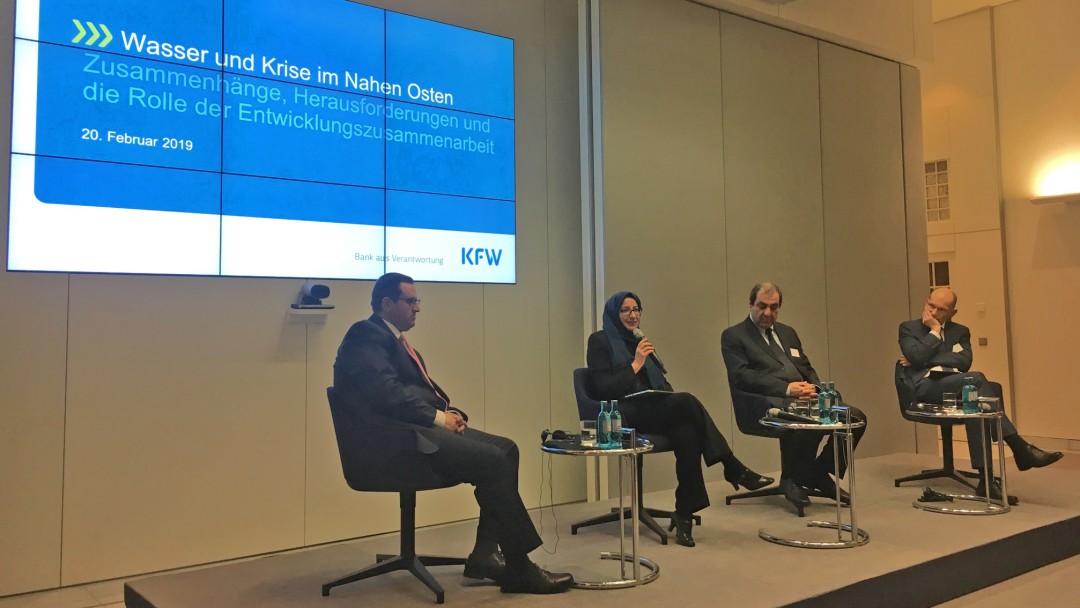News from 2019-02-28 / KfW Development Bank
Water and crisis in the Middle East

An event on “Water and Crisis in the Middle East” on 20 February at KfW's Berlin office was attended by around 50 guests from the realms of politics, academia, civil society as well as development cooperation professionals.
KfW Development Bank has worked in the global water sector for many decades on behalf of the Federal Ministry for Economic Cooperation and Development (BMZ). The Middle East region exemplifies the complex relationships between the water sector and various crises and challenges: water poverty, climate change, urbanisation, population growth and the influx of refugees who are currently arriving from Syria and Iraq. This leads to supply shortages in many municipalities and stretches them to the limits of what they can afford. At the same time, a functioning water supply can also make a contribution to stabilisation, health, employment and economic development in the Middle East region.
In his opening speech, FC Head of Department Helmut Gauges gave an overview of the interesting issues that would be discussed at the event and emphasised that the potential for conflicts about water would continue to increase. This makes it all the more important to undertake countermeasures now. He also touched on the German contribution: “Equitable distribution of water resources is indispensable for peace in the region. Well-functioning infrastructure is a vital foundation for stability and development. Germany is among the largest donors to the water sector in most countries in this region.
The Federal Ministry for Economic Cooperation and Development has addressed the various aspects of the role of water in the development process in its “BMZ Strategy for Interlinkages between Water, Displacement and Migration”, which formulates the principles of German development cooperation in this context. Klaus Krämer, Head of Division for the Middle East at the Federal Ministry for Economic Cooperation and Development, explained the objective of the ministry's commitment: “...improving living conditions and resilience reduces migration pressure and the causes of displacement”. Important for countries like Jordan or Lebanon, which have taken in a particularly large number of refugees: “In the process, a collective view of migrants, refugees and the local population is being taken”.
The contribution of Prof. Dr Alexander de Juan from the University of Osnabrück added to the discussion from a scientific point of view. There are many conflicts in the region that are caused by water scarcity. However, despite many years of research, there is no conclusive evidence that water poverty is one of the causes of displacement. Instead, several factors must occur simultaneously for people to actually leave their homes: weak governance structures coupled with significant cuts in social and economic areas, demographic and climate change.
At the centre of the evening was a chaired panel discussion in which representatives from Jordan, Yemen and Syria gave personal and vivid insights into the situation in their countries. State Secretary Iyad Dahiyat of the Water Authority of Jordan (WAJ) described the situation in the desert state, which has been taking in refugees from the region for many decades. For Jordan to remain an anchor of stability in the region, a functioning water supply and continuous donor commitment are needed. When asked by panel chair Stefan Zeeb (head of the Middle East department) what he would wish for if granted a single wish by his fairy godmother, Dahiyat didn't hesitate: support for the extraction of water from unconventional sources, e.g. the construction of – very expensive – desalination plants.
German DC also works in the water sector in countries that are difficult to access at present. Lamis Al-Iryani, head of the evaluation unit in the Yemeni non-governmental Social Fund for Development (SFD), had a very impressive film with her, recently shot in two provinces. In the village of Alamour in Taiz province, 240 cisterns have been built with KfW funds to collect rainwater. This created jobs for nearly 1,200 workers, but above all it made the lives of women and girls easier. They used to have to fetch water in impassable terrain for several hours every day – for cooking and washing, but also as drinking water for the animals. Girls now have time for school and women can devote themselves to their children and farming. In the southern province of Abyan, the infrastructure for water supply and wastewater disposal was almost completely destroyed in the armed conflicts. With the help of SFD, pipes, pumps, administrative buildings and water reservoirs were built or rehabilitated – residents now have access to affordable water. This security of supply motivates IDPs to return to their home communities. And a job means more than income for just the next few weeks: it is hope for the future.
Dr Mohammad Kayyal, who has been Programme Management Officer in the UN Environment Programme (UNEP) in Athens and Syria since last year, also considers security of supply to be of central importance. Water projects contribute to stabilisation once people can start to plan for the future again, when supply is secure and they also see opportunities for their children. Five million Syrians live outside their country and will not return until peace and security are ensured and electricity and water are reliably available. Kayyal, who has worked in recent years as a consultant in KfW-UNICEF projects, responded to the question of what he would wish for with: “I hope that “water” will no longer be misused as a political instrument. In my opinion, this is a crime against humanity – everyone has the right to water and sanitation.”

Share page
To share the content of this page with your network, click on one of the icons below.
Note on data protection: When you share content, your personal data is transferred to the selected network.
Data protection
Alternatively, you can also copy the short link: https://www.kfw-entwicklungsbank.de/s/enzBWrMC.B8bA
Copy link Link copied